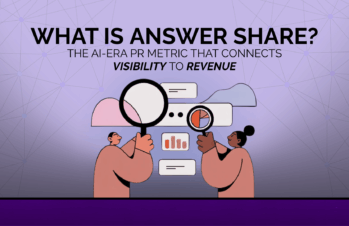B2B marketers are known to be skeptical about the power of PR. Whether this skepticism originates in a lack of information (some B2B marketing leaders don’t realize PR is more than just press releases) or an overall aversion to a PR media strategy, it’s an outdated mindset. Every company in the B2B space needs PR to increase its share of voice, drive sales, and retain customers.
Of course, we’re not talking about traditional PR. We’re talking about PR the Zen way. We combine PR and marketing efforts to drive value for our customers. And it works.
So why do many B2B marketers neglect public relations in their overall strategies? We see these explanations time and time again:
- They think PR means “press releases.” (Okay, yes, both terms use the same letters, but they are not one and the same.)
- They think industry analysts have the same reputation-boosting effect as earned media through PR initiatives.
- They haven’t had success getting the attention of major publications (everyone wants to be in Time Magazine!), and they don’t want to keep trying.
We get it. B2B marketers carry a heavy burden of proof when they bring strategies to their clients, customers, and corporate leaders. They need to show why and how marketing strategies will work (with quantifiable metrics), and PR can be challenging to measure.
But companies holding back on PR initiatives miss a wealth of opportunities to engage with customers, build the sales pipeline, and boost customer trust. Want to break the cycle of ineffective B2B marketing strategies? Here’s everything you need to know about PR for B2B companies.
What is PR?
No, “PR” doesn’t stand for “press release.” In a nutshell, public relations (or PR) is when a representative distributes information about a person, company, or organization to the public. PR is a strategic communications process that enables brands to build a positive reputation, engage with customers and prospects, and establish mutually beneficial relationships with industry stakeholders. This can include writing press releases (there it is!), reaching out to journalists with story ideas, pitching clients to be featured in podcasts, and more.
Related reading: What is Sales-Enabled PR?
Why don’t B2B marketers leverage PR?
Here’s our theory: B2B marketers don’t leverage PR because they don’t know how to measure its effectiveness. Ultimately, BRB marketers are judged by one thing: leads. Unlike inbound marketing, paid advertising, and other easily-trackable marketing initiatives, you can’t always track the total impact or number of leads earned by a single PR hit.
But digital marketing has changed significantly in the last few years, and some of the most effective marketing strategies cannot be tracked in traditional ways. For example, tracking leads through social media is harder now because many brand shares are happening on dark social. Likewise, some of the most meaningful brand recommendations or shares happen in private forums—digital or physical—and, thus, cannot be tracked by marketers. A similar principle applies to PR. While you can track the number of press hits or the number of shares a press article gets, you can’t track the number of people the article reached and how the press hit influenced them in their B2B buyer journey. This is difficult for B2B marketers to accept, so they often avoid PR initiatives in favor of more standard marketing strategies.
Related reading: Creating an Earlier Buyer Journey: Why It Matters, and Why You Should Be Reaching Out
How PR Supports Marketing for B2B Companies
When B2B companies leverage PR alongside their marketing tactics, it extends the reach of marketing messages and amplifies PR. Combining PR with marketing creates a cycle of interest in the brand. Typical marketing focuses on generating leads and, therefore, relies on marketing strategies that can be tracked. Paid advertisements extend a brand’s reach, SEO makes the brand easy to find, and social media marketing gets the product or service in front of customers. All of these factors can be tracked, measured, and tied to leads and acquisitions. These strategies work—don’t abandon them—but they can be more impactful when coupled with PR.
PR’s goal is to boost your brand’s reputation. Public relations takes a different approach to extending the reach of the brand by focusing on winning the trust of prospects and customers. PR initiatives help brands solidify public interest—through articles, interviews, podcasts, and so on—and also establish the brand’s credibility.
The modern B2B sales cycle relies more on independent research—that buyers do on their own, online—than the traditional sales methods of old. This is why PR is so critical. When buyers do their own research in the sales cycle, they look to outside experts to ensure that your company is the right fit. They will look to articles about your brand to determine if you are credible, rankings of your products in the top publications, and so on. Think about it: how do you make your own purchasing decisions? Do you take recommendations from trusted voices about those products—like Consumer Reports or other trusted review sites? Do you purchase products based on the advice of people you know? Are you more inclined to work with a brand because someone you know had a positive experience with them? Of course, your answers are “yes” and “yes” again. We all rely on (and expect) some form of outside credibility when making purchasing decisions. The same is true for B2B buyers.
How can B2B marketers measure PR effectiveness?
Have we convinced you that you need a PR strategy yet? Good. So, let’s cover the numbers part. We know you’re probably wondering. How can you measure your new PR strategy to determine its effectiveness? There are a few things you should look out for.
PR should serve your company by boosting your brand’s reputation and building meaningful connections with stakeholders.
PR is effective when:
- You engage with industry publishers or stakeholders, build relationships, and get features or mentions in relevant publications.
- You hear the phrase, “We’ve seen you guys everywhere!” Customers, prospects, and even colleagues keep telling you that your brand is everywhere.
- You’re building share of voice and distributing your messages in top publications.
- Your press placements are comparable to your competitors (meaning, you’re working with the press organizations that boost your credibility).
Measuring PR effectiveness is less about tracking specific leads and more about determining your brand’s overall reach. Your strategy is effective if your company reaches prospects and customers through features in credible publications.
Related reading: 8 Signs Your PR Strategy Needs a Professional
Is PR worth the investment?
Yes, PR is worth the investment, and every B2B marketer should make room for public relations in their overall strategy. Companies need strategic public relations strategies to build trust and engage with customers. During the buying journey, strategic public relations provides another way for brands to make contact with prospects and be part of the process of generating leads.
Your marketing strategy will benefit from strategic PR initiatives, and your brand will grow in credibility and recognition as you invest.
Ready to take the next step in your B2B marketing strategy and invest in PR? Let us show you how.




